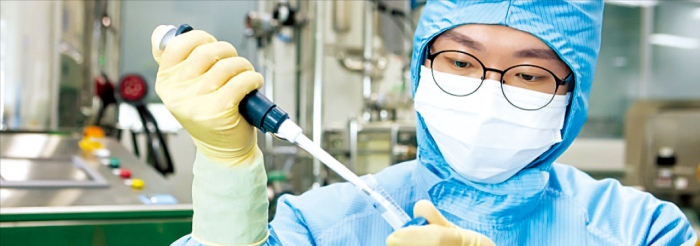Bio & Pharma
1 in 4 biotech firms struggles with decreasing cash reserves
A quarter of new drug developers in South Korea expect to exhaust their cash reserves next year
By Jun 26, 2022 (Gmt+09:00)
3
Min read
Most Read
LG Chem to sell water filter business to Glenwood PE for $692 million


Kyobo Life poised to buy Japan’s SBI Group-owned savings bank


KT&G eyes overseas M&A after rejecting activist fund's offer


StockX in merger talks with Naver’s online reseller Kream


Mirae Asset to be named Korea Post’s core real estate fund operator



South Korea’s biotechnology firms – public and private alike – are facing increasingly negative financial conditions.
The global economic downturn has also made it more challenging for private companies to list on the Kosdaq.
The Korea Economic Daily surveyed the top 50 biotech firms in terms of market capitalization and found their average cash reserves to be around 46 billion won ($36 million). Average R&D spending for each company hovered around 11.2 billion won ($9 million) last year.
But the cash reserve volume varied greatly among companies.
Out of the 50 surveyed, 14 companies will exhaust their cash reserves by next year, with research and development costs alone, if they do not receive additional funding.
The forecast is based on their average R&D spending over the past three years and liquidity as of the first quarter of this year. When taking payroll and operating costs into consideration, the companies will run out of money even sooner.
Company A, which is developing immuno-oncology drugs, has current cash reserves of 36.2 billion won. If the firm were to continue with its R&D spending of around 37.6 billion won per year, it needs to raise an additional 1.4 billion won just to stay on course.
Company B, which develops gene therapy, and Company C, which develops cell therapy products, will each be left with just 2 billion-3 billion won by year’s end.
The dire financial conditions have pushed the biotech firms to go on the offensive to secure liquidity.
As stock mortgage loans are not an option for the foreseeable future, some of the biotech firms' largest shareholders have resorted to reducing their shares for liquidity.
Eutilex Co. is considering a paid-in capital increase worth 70 billion won. The company’s chairman and co-CEO Byoung-se Kwon will sell 5.67% of his current shares in Eutilex.
“We concluded that market sentiment could worsen and plan to secure as much liquidity as possible,” an employee of Eutilex told The Korea Economic Daily.
STOCKS PLUNGE
The financial straits in the biotech industry are largely due to the bearish stock market.
KRX Health Care Index plummeted 39% in a year. Biotech firms that have yet to bring their first products to market were hit the hardest.
“There is a set amount that will be used in R&D but share prices have been cut almost by half,” said an industry insider. “Capital increases by issuing new stocks is not going to be easy.”
FORECAST GLOOMY
And the situation appears to be worse for biotech startups.
Venture capital firms are tightening their belts overall, including in the healthcare sector.
Back in 2020, a total of 17 biotech firms were listed on the Korean bourse through a special system encouraging entrepreneurship in the tech industry. The number dwindled to nine last year, and to just three in the early half of this year.
A head of a venture capital firm said: “We receive more than 50 phone calls a day from biotech companies regarding investment. As the return on investment seems murky at this point, we are being cautious about investing in developers of novel drugs.”
In addition to the bear market sentiment, the cost of clinical trials is set to increase with the unfavorable won to the greenback exchange rate.
Another venture capitalist said the biotech companies are streamlining their clinical trial pipeline based on priority.
Write to Jae-Young Han at jyhan@hankyung.com
Jee Abbey Lee edited this article.
More to Read
-
 IPOsLB Investment submits preliminary IPO assessment request to KRX
IPOsLB Investment submits preliminary IPO assessment request to KRXJun 14, 2022 (Gmt+09:00)
1 Min read -
 Pre-IPOsLemon Healthcare aims for IPO and triple jump in revenue
Pre-IPOsLemon Healthcare aims for IPO and triple jump in revenueJun 02, 2022 (Gmt+09:00)
3 Min read -
 Venture capitalS.Korean accelerators FuturePlay and Bluepoint Partners rev up for IPOs
Venture capitalS.Korean accelerators FuturePlay and Bluepoint Partners rev up for IPOsApr 25, 2022 (Gmt+09:00)
2 Min read
Comment 0
LOG IN


